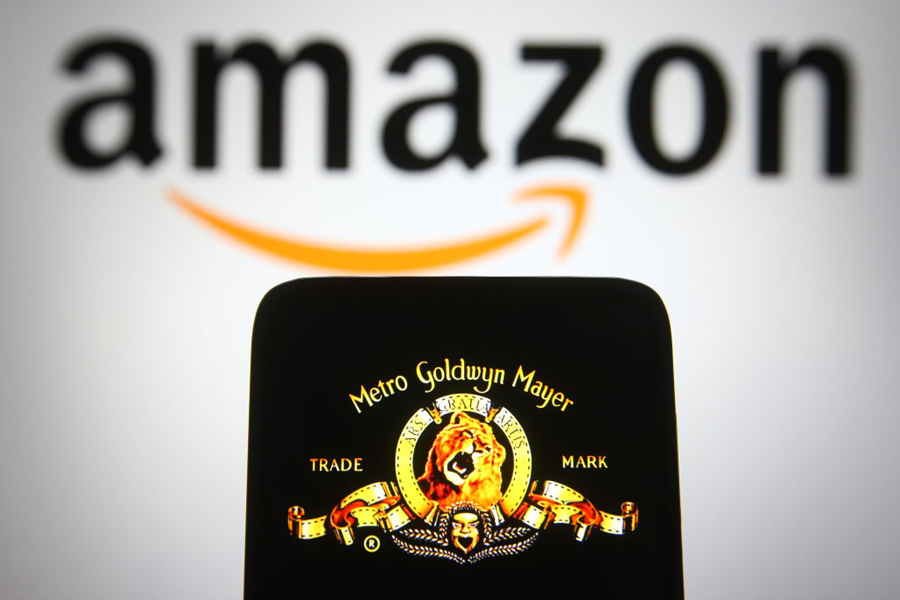Amazon Agrees To Buy MGM for $8.45 Billion
Move gives tech giant huge content franchises, including James Bond and Rocky

The smarter way to stay on top of broadcasting and cable industry. Sign up below
You are now subscribed
Your newsletter sign-up was successful
Amazon said it agreed to acquire MGM for $8.45 billion, giving the tech company a foothold in Hollywood as it takes on competitors in the video streaming wars.
The acquisition gives Amazon access to more than 4,000 films and key franchises including James Bond and Rocky, plus 17,000 TV shows including Fargo and The Handmaid’s Tale.
Read Also: Amazon-MGM Deal Talks Advance
“The real financial value behind this deal is the treasure trove of IP in the deep catalog that we plan to reimagine and develop together with MGM’s talented team. It’s very exciting and provides so many opportunities for high-quality storytelling,” said Mike Hopkins, senior VP of Prime Video and Amazon Studios.
Hopkins is a former Fox, Hulu and Sony executive. Amazon has its subscription streaming business in Amazon Prime Video, which comes as part of the Amazon Prime shopping and delivery service, as well as ad-supported channels Twitch and IMDb TV.
Read Also: Amazon Reportedly in Talks To Buy MGM for Around $9 Billion
“It has been an honor to have been a part of the incredible transformation of Metro Goldwyn Mayer," said Kevin Ulrich, chairman of the Board of Directors of MGM. "To get here took immensely talented people with a true belief in one vision. On behalf of the Board, I would like to thank the MGM team who have helped us arrive at this historic day. I am very proud that MGM’s Lion, which has long evoked the Golden Age of Hollywood, will continue its storied history, and the idea born from the creation of United Artists lives on in a way the founders originally intended, driven by the talent and their vision. The opportunity to align MGM’s storied history with Amazon is an inspiring combination.”
The smarter way to stay on top of broadcasting and cable industry. Sign up below
The Amazon move comes with Netflix established as the leading player in the streaming business, with The Walt Disney Co. charging hard on its heels with Disney Plus, Hulu and ESPN Plus. Media observers with long memories noted that Ted Turner jumped at the chance in the mid 1980s to buy MGM from investor Kirk Kerkorian, using the film library to launch Turner Classic Movies.
Last week, AT&T made a deal to spin off its WarnerMedia unit and merge it with Discovery to create an entity large enough to compete with the leaders. Between WarnerMedia, which runs HBO Max. and Discovery, which launched Discovery Plus earlier this year, the combined company spends $20 billion on content.
Speaking at the J.P. Morgan Global Technology, Media and Communications Conference, Discovery CEO David Zaslav said he was happy with the Amazon-MGM deal because of the value it puts on content.
“It’s all about the IP,” Zaslav said. He recalled people saying that Disney overpaid for Pixar and Star Wars, but that those business have both generated billions in revenues and become pillars supporting the success of Disney Plus.
“So we look at what Warner has, and it’s the greatest treasure of global IP that’s loved by everyone in the world, with the treasure we have, and you look at the value of MGM and you say ‘wow.’ What does that mean we’re worth if we can make this all come together? And I think we can,” he said.
Scott Schiller, chief commercial officer at digital media company Engine, said the Amazon-MGM deal is the tip of the iceberg as tech companies take a stepped-up approach to content and streaming video.
"The next likely scenario is a more aggressive merger or acquisition of one of the remaining traditional assets, like an NBCUniversal or ViacomCBS,” Schiller said.
Jon has been business editor of Broadcasting+Cable since 2010. He focuses on revenue-generating activities, including advertising and distribution, as well as executive intrigue and merger and acquisition activity. Just about any story is fair game, if a dollar sign can make its way into the article. Before B+C, Jon covered the industry for TVWeek, Cable World, Electronic Media, Advertising Age and The New York Post. A native New Yorker, Jon is hiding in plain sight in the suburbs of Chicago.

